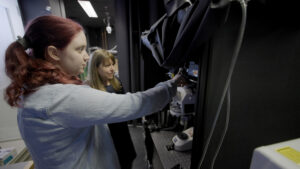Championing the next generation
BCS graduate fellows and supporters celebrate students’ roles in the research enterprise

Kendyll Burnell is a third-year student studying the role of inhibition in adult plasticity in the lab of Professor Elly Nedivi at The Picower Institute for Learning and Memory. Burnell is supported by the Gerald J. (1964) and Marjorie J. Burnett Fellowship. Photo: Endeavor Film
The Department of Brain and Cognitive Sciences (BCS) held its ninth annual Champions of the Brain Fellows event on Oct. 25, 2022. The virtual event celebrates BCS graduate students and those champions who make it possible for students to explore their scientific dreams and to drive the department’s exciting research.
MIT Dean of Science Nergis Mavalvala provided opening remarks for the celebration, detailing the importance of fellowship support to attracting the top students and faculty.
“Graduate students, whether you’re a physicist or a neuroscientist, are woven into the fabric of all the research that we do. They are partners in our thinking and really central to the research enterprise,” said Mavalvala, the Curtis (1963) and Kathleen Marble Professor of Astrophysics.
Associate Professor Josh McDermott PhD ’07 hosted the celebration. In his opening remarks, McDermott shared his personal experience as a graduate student in BCS as a past recipient of the Gerald J. (1964) and Marjorie J. Burnett Fellowship. He spoke about how the talent of BCS graduate students influenced his decision making when considering offers for faculty positions.
“When I was on the faculty job market and thinking about where to go to be a professor, the quality of the students here at MIT was a major factor in deciding that this is really where I needed to be. The students here are truly exceptional and it’s such a privilege to work with them,” said McDermott, who is also the associate department head and an associate investigator at the McGovern Institute for Brain Research. “Graduate fellowships are totally critical to MIT’s innovation and excellence.”
The celebration featured the premiere of a video profile of BCS graduate student Fernanda de la Torre, who like McDermott was a recipient of the Gerald J. (1964) and Marjorie J. Burnett Fellowship, as well as a recipient of the prestigious Hubert J. P. Schoemaker (1976) fellowship. De la Torre also recently received the 2022 Paul and Daisy Soros Fellowship for New Americans. Fernanda’s story as an undocumented child coming from Mexico to the United States to then seek better educational opportunities highlighted the resilience and tenacity of MIT graduate students, and the powerful support fellowships provide to young scientists.
The celebration continued with talks by three current graduate fellows, including Aída Piccato, a third-year student in Professor Mehrdad Jazayeri’s lab supported by the James S. (1972) and Muguette Alder Fellowship. Piccato spoke about her work to understand the neural basis of memory strength, using multi-area neural recordings in non human primates. The second speaker, Sadie Zacharek, a third-year in Professor John Gabrieli’s lab supported by the Irene T. Cheng (1978) Fellowship, discussed her project examining neural markers of treatment mechanism and predictions for treatment outcomes in social anxiety. The final student speaker was Kendyll Burnell, a third-year in Professor Elly Nedivi’s lab supported by the Gerald J. (1964) and Marjorie J. Burnett Fellowship, presented her research on the role of inhibition in adult plasticity. Following a question-and-answer period with the graduate fellows, champions, faculty, and fellows were split into breakout rooms to allow for more intimate conversation.
The concluding segment of the celebration included prerecorded remarks from BCS Department Head Michale Fee, as well as remarks from Barrie R. Zesiger HM, MIT Corporation life member emeritus and a founder of Champion of the Brain Fellows.
Zesiger discussed the impact of supporting neuroscience research through the next generation of scientists. She also encouraged continued involvement and support from the audience.
“Graduate students are set up to be the entrepreneurs of most labs; and it’s this entrepreneurship that can provide the rocket fuel for research for a better world,” said Zesiger. “I want to multiply those of us who’ve given; I want us to give more, and I want us to find others who, of our friends, or colleagues [who wish to support BCS graduate students.]”
In closing, Fee emphasized the special, symbiotic relationship between graduate students and faculty.
“The word ‘student’ can imply a one-directional transfer of information: You’re the student, and I’m the teacher. But the really wonderful thing about our graduate students, what I treasure the most, is what they have taught me,” Fee said. “Students see scientific problems with fresh eyes, they think about things differently . . . With their new perspective, students can bring deep, old questions back to life. And being able to see our own research through these fresh, creative, unjaded eyes helps keep me enthusiastic.”
Fee concluded: “By supporting our graduate students, you are helping to fire the engines of creativity in a promising young scientist, to enable them to do their best work in this extraordinary community of scholars. You are also supporting a legacy of faculty mentoring students, who then become mentors themselves — a generational cycle that is fundamental to advancing knowledge.”
The annual Champions of the Brain Fellows honors those donors who commit $100,000 or more through an endowed, expendable, or corporate gift to support graduate students at the forefront of cutting-edge research in BCS.
Learn more about supporting BCS.
Devan Monroe | Department of Brain and Cognitive Sciences